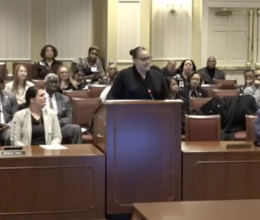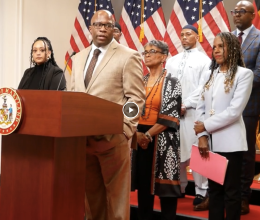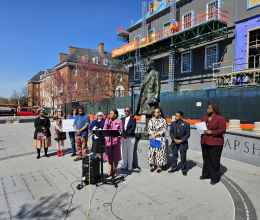
MEDIA RELEASE
ACLU of Maryland Lauds Passage of Bill Advancing Parity for Girls in
Juvenile Justice System
FOR IMMEDIATE RELEASE
Monday, April 11, 2011
CONTACT: Meredith Curtis, ACLU of Maryland, 410-889-8555; media@aclu-md.org
Melissa Goemann, ACLU Legislative Director, 410-693-4877; goemann@aclu-md.org
ANNAPOLIS - Today, the American Civil Liberties Union of Maryland lauds passage of legislation (HB511/SB 787) that would require the state Department of Juvenile Services (DJS) to create a detailed plan to provide equitable resources for girls' services. The ACLU thanks the bill sponsors, Del. Kathleen Dumais and Sen. Jamie Raskin, as well as Del. Susan Lee, the head of the Women's Caucus (all D-Montgomery), for their leadership in advancing parity for girls in the juvenile justice system. The bill now goes to the desk of Governor Martin O'Malley, who hopefully will sign it into law.
"Slowly, but surely, we are bringing girls in Maryland's juvenile justice system out of the shadows," said Sonia Kumar, an attorney managing the ACLU of Maryland's juvenile justice project. Kumar continued: "Thanks to this legislation, for the first time in its history, DJS is required to develop a detailed roadmap for how it will fulfill its constitutional obligations to serve girls effectively and fairly. Just as importantly, this legislation has been critical in bringing together and mobilizing strong allies for reform in the legislature, the judiciary, the Governor's office, and the community at large. We are committed to working with our partners to ensure that Maryland provides girls in the juvenile justice system with the services and programs they need and deserve."
For two years, the ACLU of Maryland has been fighting for legislation to require that DJS provide girls with services and programs that are equivalent to those offered boys. HB 511/SB 787 was important because of serious disparities in services for girls, particularly a lack of alternatives to detention, treatment options, and vocational training. As originally drafted, the legislation would have clarified the state's obligation to allocate its resources fairly to ensure that girls in the juvenile justice system receive basic opportunities.
However, the bill was burdened by an erroneously high fiscal note of $2 million (even DJS objected to the amount), so passage of the full bill was not possible during such a tight budget year. However, a section of the bill requiring DJS to make a detailed plan to advance parity for girls and report on this to the General Assembly before the start of session next year has passed.
As things stand now, because of the lack of services, girls end up cycling through expensive and highly restrictive programs whether or not such placements are appropriate. The DJS operating budget exceeds a quarter of a billion dollars; providing fair and equitable treatment for the fewer than 200 girls in its custody does not require a large new infusion of resources. Much can be accomplished simply by opening up existing services to girls and utilizing community-based alternatives. DJS's current plans to serve girls involve building a $13 million treatment facility and $50 million detention center 10 years from now. It does not make sense to spend $63 million and end up with no more options for girls than we have today. HB 511/SB 787 is an important first step toward ensuring that DJS allocates its resources in a more fair and effective way.
###







